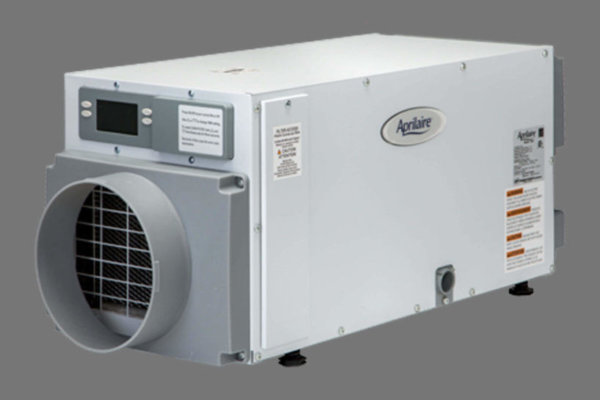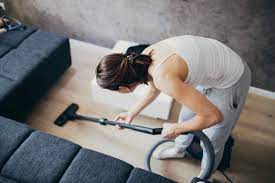Spring might be the classic allergy trigger time, but fall allergies can be just as bad, or worse. When the weather starts getting cooler and transitioning from summer to fall, a new set of allergens fills the air.
Allergens can be a big nuisance -- they may trigger asthma attacks, mimic cold symptoms, and just make you feel blah. Luckily, there are helpful indoor air quality (IAQ) management tips that you can follow to prevent these allergy issues.

How Can Indoor Air Quality Affect Me?
Not so fun fact: the air inside your home can be worse than the air outside when it comes to allergens. The reason is, once the allergens come into your home, they are trapped inside and have nowhere to go, causing you to continually breathe them in.
There are four common Fall allergens: ragweed, mold and mildew, dust mites, and pet dander. Ragweed is especially common, as it blooms in August and pollinates throughout the fall until temperatures reach freezing.
As you may know, allergies are how our bodies react to foreign substances such as pollen, dust, ragweed, mold, and more. Once these are breathed in and the allergen is detected, our body goes into action, flooding the bloodstream with histamines. Histamines cause sneezing, congestion, red and itchy eyes, and a host of other unpleasant symptoms.
We can take allergy medications to battle these symptoms, but many times the medication can only do so much. This is especially true if it has been a while since you've gotten your HVAC units cleaned and looked at. Your heating and cooling systems can contain the allergens listed above and will only build up the longer you go without treating your system. This leads to poor indoor air quality and worsened fall allergies.
How Do I Boost Indoor Air Quality?
You can't filter pollen and other allergens from the outside air, but you can keep indoor air much cleaner to prevent any allergy problems. Changing your HVAC system filters regularly -- once a month, or even more often than that -- is the best first line of defense. Scheduling tune-ups for your HVAC systems also ensures cleaner air is produced. These annual maintenances include checking and cleaning air filters, checking the blower for cleanliness, inspecting parts like the condenser and evaporator coil, cleaning the outdoor condenser coil, and other inspections that benefit the system.

The more humid your house is, the more likely humidity will cause the air to worsen allergies and allergy symptoms. Another way to improve indoor air quality is by using a dehumidifier to absorb more humidity from your home than a normal system. The system draws in warm air currents through its fan with a coil, then the warm air is contracted and condensation is produced and left in the system.
Air purifiers can also help prevent allergens. They are effective in killing bacteria, molds, and fungi, and can even employ advanced oxidation technology which produces air oxidizers that kill or reduce foreign substances. Using these systems will improve your health by providing cleaner and less polluted air in your home.
What other ways can I improve my indoor air quality?
Other ways to improve IAQ include simply cleaning the inside of your home regularly. It is important to remember that not only do allergens float in the air, but they also live on surfaces. Making sure the filters of your HVAC systems are free of any dirt,  dust, etc., and replacing them regularly are crucial in taking steps to provide for a cleaner home. Vacuuming your home is also important so that dust and pollen particles that lay around your home are sucked out and away from your HVAC system. Mopping, damp dusting, and even making sure you clean your bed sheets and pillow covers regularly are helpful in eradicating allergens as well. Also, don't forget to keep your windows closed, especially during the peak pollen season. If you're outside during this time, change your clothes and throw them in the wash to eliminate any allergens that may float into your home and negatively affect your indoor air quality.
dust, etc., and replacing them regularly are crucial in taking steps to provide for a cleaner home. Vacuuming your home is also important so that dust and pollen particles that lay around your home are sucked out and away from your HVAC system. Mopping, damp dusting, and even making sure you clean your bed sheets and pillow covers regularly are helpful in eradicating allergens as well. Also, don't forget to keep your windows closed, especially during the peak pollen season. If you're outside during this time, change your clothes and throw them in the wash to eliminate any allergens that may float into your home and negatively affect your indoor air quality.
 dust, etc., and replacing them regularly are crucial in taking steps to provide for a cleaner home. Vacuuming your home is also important so that dust and pollen particles that lay around your home are sucked out and away from your HVAC system. Mopping, damp dusting, and even making sure you clean your bed sheets and pillow covers regularly are helpful in eradicating allergens as well. Also, don't forget to keep your windows closed, especially during the peak pollen season. If you're outside during this time, change your clothes and throw them in the wash to eliminate any allergens that may float into your home and negatively affect your indoor air quality.
dust, etc., and replacing them regularly are crucial in taking steps to provide for a cleaner home. Vacuuming your home is also important so that dust and pollen particles that lay around your home are sucked out and away from your HVAC system. Mopping, damp dusting, and even making sure you clean your bed sheets and pillow covers regularly are helpful in eradicating allergens as well. Also, don't forget to keep your windows closed, especially during the peak pollen season. If you're outside during this time, change your clothes and throw them in the wash to eliminate any allergens that may float into your home and negatively affect your indoor air quality.Where do I go for more information?
For more information on indoor air quality, click the buttons below! If your HVAC system is older or has been giving you constant problems, schedule a free consultation for a new system right here on our website, or call us at 215-245-3200. Otherwise, use the steps that were talked about above and see the difference that they make in your home.

If you live in the Delaware Valley/Greater Philadelphia area and would like to find comfort within your home, visit our website or give us a call at 215 - 245 - 3200 to learn more.







